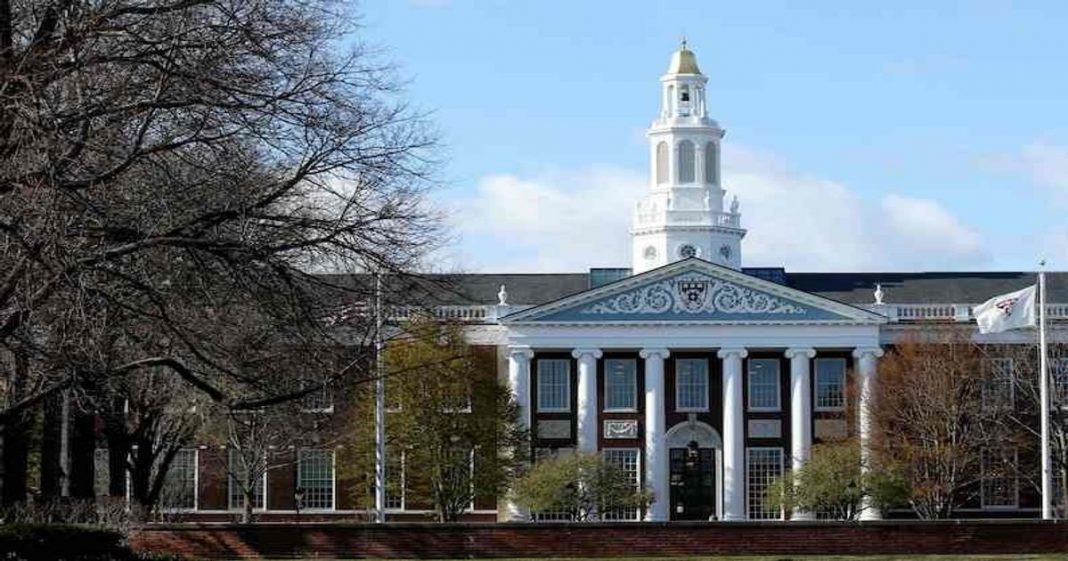United States President Donald Trump issued a proclamation Wednesday evening barring foreign students from entering the U.S. to attend Harvard, citing national security concerns and accusing the University of failing to comply with federal agencies.
The order, effective immediately, suspends entry under Harvard-hosted student and exchange visitor visas. The move follows what the Trump administration described as Harvard’s “failure” to comply with Department of Homeland Security requests for information regarding alleged criminal and disciplinary activity involving international students.
Read more: Kohli dedicates IPL title to fans ahead of homecoming victory parade
The suspension is set to last six months, with the potential for extension.
The order suspends the entry of future international students and exchange visitors who planned to begin studies or research at Harvard, effectively halting new admissions under F, M, and J visa categories.
It also places current international students and researchers at Harvard under review, directing the Department of State to consider revoking existing visas on a case-by-case basis.
More than 10,000 international students and scholars study at Harvard — and admitted students for Harvard’s incoming classes largely have yet to travel to campus for the fall semester.
Trump’s proclamation comes less than three weeks after the DHS attempted to strip Harvard of its certification to enroll international students through the Student and Exchange Visitor Program, a decision that would have effectively barred the University from hosting any foreign students.
Harvard sued the federal government just one day later, and a federal judge temporarily blocked the DHS action, allowing the University to continue enrolling international students.
But Trump’s Wednesday order attempts to circumvent the ruling through presidential authority.
In a fact sheet supporting the order, Trump cited an oft-repeated set of grievances against Harvard, including allegations of campus antisemitism, support for diversity, equity, and inclusion policies, rising campus crime rates, and a failure to comply with the DHS’ records request.
Read more: Israel losing most steadfast EU supporter – Bloomberg
Harvard swiftly clapped back, arguing that the entry ban on University affiliates was unlawful.
“This is yet another illegal retaliatory step taken by the Administration in violation of Harvard’s First Amendment rights,” University spokesperson Jason A. Newton wrote in a statement. “Harvard will continue to protect its international students.”
But if Harvard sues over the Trump administration’s latest move, it might face headwinds at the Supreme Court, even if it secures a temporary block.
During Trump’s first term, he repeatedly tried to ban entry from Muslim-majority countries, eventually excluding North Korean and Venezuelan nationals as well. The first two versions of his ban were stymied in court, but a third version was upheld by the Supreme Court in a victory for expansive presidential authority under the Immigration and Nationality Act.
Immigration lawyer Ian A. Campbell wrote in a text message that Trump’s Wednesday proclamation relied on the same authority as the travel ban that was ultimately upheld by the Supreme Court.
“Even though Trump said repeatedly that he would ban entry of all Muslims,” Cambell wrote, “the Court said that because the order itself doesn’t actually ban all Muslims explicitly, it doesn’t violate the Constitution.”
Campbell wrote that, if Harvard challenges the proclamation, it may face an uphill battle — unlike the earlier travel bans, the Harvard order does not appear to disfavor a religion, which would directly implicate First Amendment rights.
“I think Harvard will ultimately have difficulty challenging this. I am sure they can get an injunction in the lower courts, but I am doubtful the Supreme Court would rule in their favor if they take the case,” Campbell wrote














